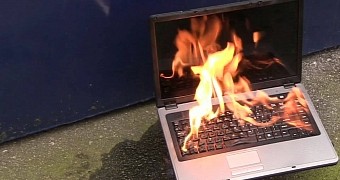Windows 10 comes with the same system requirements as Windows 8.1 and Windows 7, so it should be running at least as smoothly on all PCs that were previously powered by any of these two operating systems.
But it turns out that, at least on some of the laptops and PCs that got the upgrade to Windows 10, the operating system doesn’t get along very well with the hardware hidden under the hood, and users are experiencing very poor battery life and overheating issues.
The two problems might be closely connected to each other, so it’s only natural to experience decreased battery life when the device overheats.
We’re having the same problem on a several-year-old Lenovo T400s, which tends to overheat in less than 5 minutes after a cold start, while running perfectly fine on Windows 8.1 and Ubuntu. The T400s has a Core 2 Duo processor running at 2.5 GHz, 8 GB of RAM, and a lithium-ion battery that right now offers up to 2 hours of autonomy in Windows 8.1. In Windows 10, this drops to around 40 minutes.
Feedback reports
A quick search on the web and a look in the Windows 10 Feedback app confirm that we’re not the only ones experiencing battery problems and overheating in Windows 10, as several hundred insiders who tried out early builds of the operating system have already reported them to Microsoft.
“Battery life appears to be much decreased on my Surface Pro 2 than what I’ve experienced with Windows 8.1. Battery drain seems more increased,” one of the users who had problems with battery life after the Windows 10 upgrade explains in a post that already has a couple hundred votes.
Right now, there’s no workaround that could help users having problems with battery life and overheating in Windows 10, but trying to close background processes that you don’t need could actually help. Also, disabling data tracking services, which we know run in the background all the time, might actually come in very handy.

 14 DAY TRIAL //
14 DAY TRIAL //